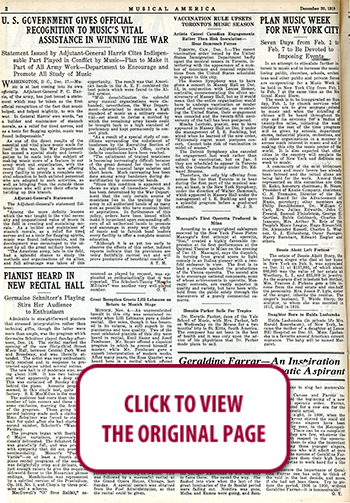 100 YEARS AGO IN MUSICAL AMERICA (318)
100 YEARS AGO IN MUSICAL AMERICA (318)
December 20, 1919
Page 2
U. S. GOVERNMENT GIVES OFFICIAL RECOGNITION TO MUSIC’S VITAL ASSISTANCE IN WINNING THE WAR
Statement Issued by Adjutant-General Harris Cites Indispensable Part Played in Conflict by Music—Plan to Make it Part of All Army Work—Department to Encourage and Promote All Study of Music
WASHINGTON, D C., Dec. 17.—Music is at last coming into its own officially. Adjutant-General P. C. Harris, of the army, has just issued a statement which may be taken as the first official recognition of the fact that music helped, and helped mightily, to win the war. In General Harris’ own words, “as a builder and maintainer of staunch morale, as a relief for tired nerves, and as a tonic for flagging spirits, music was found indispensable.”
As one of the direct results of the essential and vital place music made for itself in the war, the War Department has caused a special study and investigation to be made into the subject of making music more of a feature in our army work and organization, with the result that the army is now offering every facility to provide a complete musical education to both enlisted personnel who are adapted to such activities, as well as bringing from the outside those musicians who will give their efforts to building up this branch.
The Adjutant-General’s statement follows:
“Among the more definite lessons which the war taught is the vital necessity and unquestioned value of music in the field in creating and sustaining morale. As a builder and maintainer of staunch morale, as a relief for tired nerves and as a tonic for flagging spirits, music was found indispensable, and its development was encouraged to the utmost by all the great military leaders.
“The American army, late in the field, had a splendid chance to study the methods and organizations of its allies, and full advantage was taken of this opportunity: The result was that American bands in the A. E. F. combined the best points which were found in the Allied armies.
“With demobilization the splendid army musical organizations were disbanded; nevertheless, the War Department—determined to maintain a high standard of music as a military essential—set about to devise a method by which the remaining army bands could be brought back to a high standard of proficiency and kept permanently to concert pitch.
“As a result of a special study of conditions surrounding the enlistment of bandsmen by the Recruiting Section of the Adjutant-General’s Office, certain definite conclusions have been reached.
“The enlistment of trained musicians is becoming increasingly difficult because of the great demand for them in civil life, and the unusual large salaries and short hours. Much canvassing has been done among army bandsmen during demobilization by commercial bands.
“Since this condition is apparent and shows no sign of immediate change, it has been determined by the War Department that the only certain source of musicians lies in the training by the army in all authorized bands of as many men as possible who have musical talent or aspirations. In furtherance of this policy, orders have been issued which make it incumbent upon commanding officers of all authorized bands to promote and encourage in every way the study of music and to furnish band leaders every facility to offer a complete musical education.
“Although it is as yet too early to observe the effects of this order, indirect reports indicate that its provisions are being faithfully carried out and will prove productive of beneficial results.” —A. T. M.




 RENT A PHOTO
RENT A PHOTO





